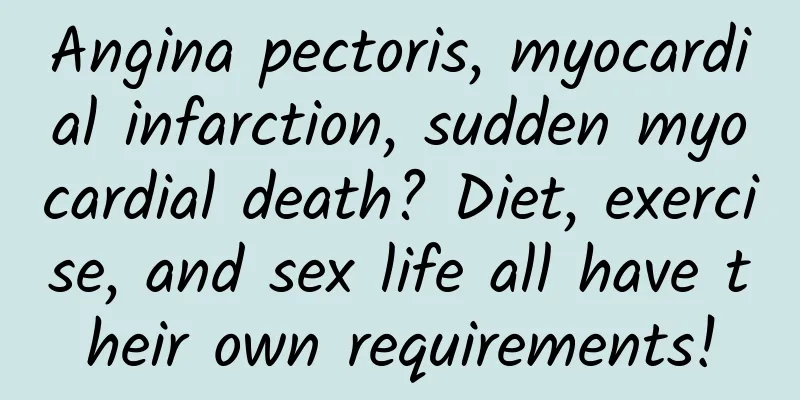Angina pectoris, myocardial infarction, sudden myocardial death? Diet, exercise, and sex life all have their own requirements!

|
Author: Chen Mulei, Chief Physician, Beijing Chaoyang Hospital, Capital Medical University Reviewer: Jin Mei, Chief Physician, Beijing Anzhen Hospital, Capital Medical University Acute coronary syndrome includes unstable angina, non-ST-segment elevation myocardial infarction, ST-segment elevation myocardial infarction and sudden myocardial death. They have one common feature, which is myocardial ischemia caused by coronary atherosclerosis. Many friends are very concerned about what should patients with acute coronary syndrome pay attention to in terms of diet and exercise? Can they still have sex? Let's find out together. 1. What should patients with acute coronary syndrome pay attention to in their diet? Diet has a very close relationship with the occurrence and development of acute coronary syndrome. For example, some diets can cause elevated cholesterol levels in the blood. The occurrence and development of atherosclerosis is directly related to elevated cholesterol. For example, animal offal and egg yolks have relatively high cholesterol content, so we need to limit their intake. Restriction does not mean that we cannot eat them at all. Egg yolks also have their good ingredients. For example, eating 2-3 eggs a week is still okay for most patients. Some drugs can also help us control cholesterol levels. In this way, the beneficial effects of food are maintained without causing elevated blood lipids. This is one aspect. Another thing is blood sugar, which is also closely related to atherosclerosis. Therefore, when eating, patients with diabetes should strictly follow the instructions of endocrinologists. You can't eat more today because the food is delicious, and eat less tomorrow because you don't like the food. In this way, blood sugar fluctuates greatly. High blood sugar will cause great damage to blood vessels, and low blood sugar is also dangerous, and may even cause coma and endanger the patient's life. Another is a high-salt diet. Because the food in our country is generally heavy in flavor, the salt intake is relatively high. 5-6 grams of salt a day is enough to meet our physiological needs. But in reality, the salt intake in the north can reach about 12 grams, and the highest can reach about 18 grams, which is far beyond the needs of our body. Excessive salt intake can easily cause water and sodium retention in the body, which is very unfavorable for the control of high blood pressure. High blood pressure is also a very important risk factor for cardiovascular and cerebrovascular diseases. Therefore, low fat, low sugar and low salt are very important for controlling acute coronary syndrome. In addition, eating more fiber-rich foods, keeping bowel movements regular, and avoiding cerebral ischemia events caused by constipation can also reduce the occurrence of acute coronary syndrome. Figure 1 Original copyright image, no permission to reprint 2. What should patients with acute coronary syndrome pay attention to when exercising? If the patient has made it through the acute phase, they are generally encouraged to do some exercise. In terms of time, in the early stage, such as right after a myocardial infarction, the amount of activity should be appropriately limited. Generally, you should stay in bed for the first two days. After three days, you can start some activities in bed. After one week, you can gradually move around the bed and increase the amount of activity. After two or three weeks, you can gradually transition to walking, such as walking for 5-10 minutes each time. The length of the walk needs to be controlled by yourself. If the patient still has chest tightness, chest pain and other symptoms during exercise, it means that the amount of exercise may be too much and should be reduced appropriately. To what extent should it be reduced? For example, when discomfort occurs during exercise, the heart rate is 110 beats/minute. If the heart rate is reduced to 80 beats/minute during exercise, the discomfort during exercise may be controlled to a certain extent. After three weeks, a doctor specializing in sports rehabilitation will develop an exercise prescription based on the patient's vascular condition and heart function, gradually increasing the amount of exercise, including some aerobic exercise and even some resistance exercise. However, during the exercise process, we must also follow the principle of gradual progress. First, there is a warm-up period, then a training period, and then a recovery period. This forms a cycle, which slowly increases the body's adaptability, exercises the function of the heart, and allows it to gradually recover. Figure 2 Original copyright image, no permission to reprint 3. Can patients with acute coronary syndrome still have sex? For patients with acute coronary syndrome, if the disease has not been controlled, whether they can have sexual intercourse can be determined by their usual exercise tolerance. For example, if a patient can walk upstairs at a speed of 70-90 steps per minute, and his heart rate does not react very obviously after going upstairs, not exceeding 114 beats per minute, it means that his exercise tolerance is still good. Generally speaking, sex is relatively safe. But if this is not the case, mild activity may induce myocardial ischemia, and sex still has certain risks. This is based on the situation before the disease is controlled. If revascularization is done, it will be relatively safer. However, there are still some unpredictable factors in the early stage of acute myocardial infarction, including the occurrence of arrhythmias. During this sexual life, due to the excitement of the sympathetic nerves, malignant cardiac events can also be induced. Therefore, in the early stage, it is generally recommended to avoid sexual intercourse within 6 weeks after acute myocardial infarction. Later, depending on his sexual function, ischemia, and response to treatment, he can gradually consider resuming sexual intercourse. |
<<: Multiple, severe, life-threatening! How to treat acute coronary syndrome?
>>: Understand cholesterol and triglycerides, protect your cardiovascular system!
Recommend
How to regulate the uterus after miscarriage? These three aspects must be achieved
If a woman has a miscarriage, her uterus will be ...
What is the reason for the burning smell of the face towel after it is soaked in water? What is the garbage of the face towel soaked in water?
Why does the face towel smell after being soaked ...
Can I get pregnant after clearing the fallopian tube adhesions?
Adhesions in female fallopian tubes are the cause...
Liquid stains on women's underwear
Leucorrhea in female genitals is normal. This is ...
What are the effects of eating instant noodles on the fetus during pregnancy?
Since the soup base of instant noodles is very de...
At what age do women enter menopause?
Both men and women will go through menopause when...
Can purslane still be eaten after being stored for a year? How to store purslane for a long time?
Purslane is very common in rural areas. It is oft...
Attention! If you have these 8 symptoms, don't "tough it out", there is a big crisis!
As people grow older and have richer life experie...
Which is more accurate, vaginal ultrasound or abdominal color Doppler ultrasound?
Vaginal ultrasound and abdominal color ultrasound...
Gaining weight and amenorrhea after using Mirena
The Mirena IUD is a new contraceptive device. It ...
Why do I have backache and bloating?
There are many possible causes of lower back pain...
How to prevent cervical cancer?
First, vaccination In fact, we all know that vacc...
What to do if you have stomach pain and diarrhea during breastfeeding
Symptoms such as stomach pain and diarrhea during...
Why does my baby frequently eat milk at night? Why does my baby sleep restlessly in the middle of the night and frequently eat milk at night?
We all know that it is a common phenomenon for ba...
Breast pain during pregnancy
Their breasts are very important for the baby, so...









